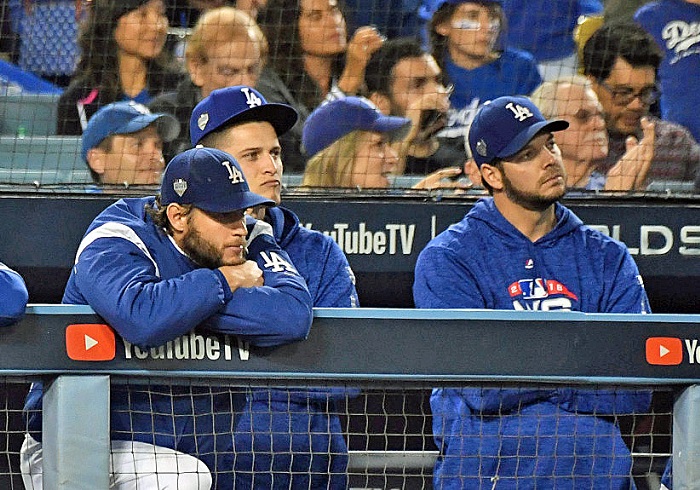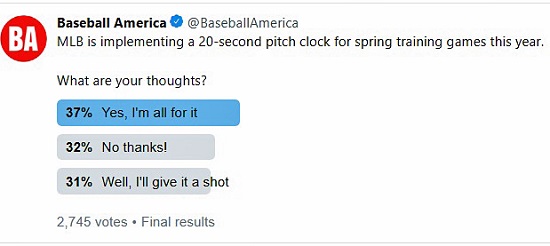Here’s the scenario:
It’s Game-7 of the 2019 World Series between the Dodgers and Red Sox at Fenway Park. The score is tied 2-2 with two outs in the bottom of the ninth. The bases are loaded and right-hander Pedro Baez is on the mound for the Dodgers. The count is full. The outcome of the the biggest game of the year is on the line and could be decided on the next pitch. As he always does, Baez stares in for the sign, and stares, and stares. Suddenly, home plate umpire Angel Hernandez throws both hands in the air signaling time out. He points to the batter, points to first base, points to the runner on third base, points at home plate, points to the official scorer, holds up four fingers indicating that ball four was automatically called because Baez had violated the 20-second pitch clock rule. Game Over. World Series Over. The Red Sox are the champions of baseball without the final pitch ever having been thrown because of the pitch clock rule imposed by commissioner Rob Manfred way back in Spring Training.
Breathe easy, baseball fans, such a scenario cannot and will not ever happen … not yet, at least. Here is MLB Rule 5.07 (c) (8.04) – aka: The Pitcher Delay Rule – verbatim:
5.07 (c) (8.04) Pitcher Delays
When the bases are unoccupied, the pitcher shall deliver the ball to the batter within 12 seconds after he receives the ball. Each time the pitcher delays the game by violating this rule, the umpire shall call “Ball.”The 12-second timing starts when the pitcher is in possession of the ball and the batter is in the box, alert to the pitcher. The timing stops when the pitcher releases the ball.
The intent of this rule is to avoid unnecessary delays. The umpire shall insist that the catcher return the ball promptly to the pitcher, and that the pitcher take his position on the rubber promptly. Obvious delay by the pitcher should instantly be penalized by the umpire.
The obvious catch here is “When the bases are unoccupied,” which would prevent the above scenario from ever happening. But what can – and will – happen beginning today is that there will be a pitch clock in play – at least for Spring Training games.
What do the players think of this? Probably what you expected.
“I’m not going to pay any attention to it,” said Dodgers ace and future Hall of Famer Clayton Kershaw. “And if I go over it then I go over. I’m not going to change anything I do. I’m not going to pay attention to it one bit, and if it becomes a problem I guess I’ll have to deal with it then. But I think there’s ways to fake it. If it looks like it’s winding down or something you can step off. I’m sure there are ways around it. I’m not too worried about it.
“The commissioner’s office wants pace of play, but the game has changed so much that there’s so many swings and misses, there’s so many strikeouts, there’s so many home runs, there’s so many fill-in-the-blank,” Kershaw added. “It’s like almost two steps forward, one step back type situation. So I’d be interested to see if the game clock actually makes a difference.”
Veteran left-hander Rich Hill agrees wholeheartedly … and then some..
“I don’t really like it, it’s ridiculous,” Hill said. “What’s the end goal of being able to have a time clock? Is it to fit baseball games in a three-hour window so we can sell it to networks? I think there has to be a serious conversation about this because I don’t think it’s going to make any difference. We’re going to speed up the game by five minutes? Is that 10 minutes going to make a difference? I don’t think so.
“Or is it somebody else’s agenda because they want to leave their mark on the game to say, ‘Look what I did?’ as opposed to leave the game alone?” added Hill. “Leave it alone. In my opinion, it’s great the way it is”

Interestingly, a less-than-scientific poll on Twitter by Baseball America suggests that baseball fans don’t necessarily agree with the two Dodgers left-handers, albeit only slightly.

Ironically, the pitch clock rule is not a rule that was negotiated for (or against) between Major League Baseball and the Major League Baseball Players Association during the current Collective Bargaining Agreement, which went into effect on November 30, 2016 and runs through December 1, 2021. Instead, it is a rule that was conceded to by the MLBPA giving the commissioner of baseball sole discretion to impose it without recourse or further negotiation. It could, however, be yet another straw in the increasing tension between the MLB, team owners, and the players union of late, especially over free agency issues.
Stay tuned…
* * * * *




 February 23rd, 2019 at 9:00 am
February 23rd, 2019 at 9:00 am  by Ron Cervenka
by Ron Cervenka  Posted in
Posted in 

If it can shorten the game by, at least, a half an hour, I’m all for it.
Seems like they should stop the clock when the pitcher starts his windup. Not sure if 12 seconds is the right number. I think it should be vetted in the minors for a year before it goes to the MLB so they can work out thinks. If that’s already been done, so be it.
–
Let’s do a little math. Let’s say there’s on average 300 pitches for each game. Let’s say that 2/3 of those are with no runners on. That will give us around 200 pitches that qualify. If it trims 10 seconds off each pitch, that will trim 2000 seconds off the game. 5 seconds saved will yield 1000 seconds off the game. The net saving would be somewhere between 33 minutes and 17 minutes. This would get most games under the 3 hour mark. If that’s the goal, there’s a good chance this rule will help accomplish that goal.
–
I’m also becoming open to the ideal of relief pitchers facing a minimum number of hitters, whether that number is 2 or 3, I’m undecided. But, being a Dodgers fan, I’m so sick of multiple pitching changes during and inning. Maybe even a rule that says you can only make 1 or 2 pitching changes once an inning starts. Any of these new rules should be tested in minor league games for a year minimum.
I think you have nailed the real issue, the numerous pitching changes starting as early as the 6th inning. I do not have any stats to back up my theory, but I watch around 95% of Dodgers games on TV as well as other games in my area (North Carolina) and it seems that the first 5 to 6 innings flow well, but last 1/3 of the game drags with the frequent pitching changes, mound visits, pinch hitters, 7th inning God Bless America and Take Me Out to the Ball Game, etc.
The rule they’re testing has the 20-second clock stop when the pitcher starts his wind-up or stretch.
A key element to the time between pitches is “The 12-second timing starts when the pitcher is in possession of the ball and the batter is in the box, alert to the pitcher. The timing stops when the pitcher releases the ball.” Until umpires enforce rule 5.04 (b) Batters Box and not allowing hitters to step out of box to adjust batting gloves, jock straps, lick their bats, etc. a 20 second or 12 second enforcement will have no effect on pace of play.
In 10 minutes the long, cold winter will be over (regardless of all the snow outside). I’ll be watching the Dodgers \o/
No Matter what is will not shorten the game. Baseball is getting stupid and pathetic. Rob Manfred is a clown and joke. They need to stop with 162 game crap and shorten the season. It’s only going down hill for here. No wonder baseball least favorite sport to watch. because of this crap!!!
Why shorten the season? If you don’t want to watch 162 games just don’t. I want more.
Curious. What is a baseball-hater doing here on a baseball blog? Baseball is not perfect, except for all the other pro sports.
If they limit the commercials to 30seconds at the change of inning, that would save about 18 minutes a game. But we don’t have to hear about that!
I think Manfred is watching the games on TV and he sees all the people glued to their smartphones while the game is going on (to which I ask: WTF are you people doing, you paid good money for a ticket, parking, hot dogs, etc.) and he’s asking himself: “How can I get these people to look up from their smartphones?”
“Maximizing the action on the field” seems to be the obvious answer, thus minimizing everything that takes away from this, thus the limit of pitching visits, now accelerating the pitcher-batter interaction is next on the list. (Looking at you, Kyle Farmer, stop playing with your gloves and get the hell in the box!)
I’m not (necessarily) in favor of a pitch clock, but “slow” guys like Baez do irritate me. Esp. regarding him, I think the less he uses his brain and just throws whatever the catcher calls for will do him miracles, but he’s not the only slow-mover on the team. Stripling is another. These guys can easily chop 10-15 seconds off of each throw, if they would just turn off their brains.
Kershaw I wouldn’t worry about; he gets right to it.
Nice scenario, but MLB has a habit of suspending their idiotic rules-changes during the playoffs, validating the hypocrisy of “doing what’s best for the game” — except in the biggest games. Anyway, after 50 years of being a fan, last year was my last year.